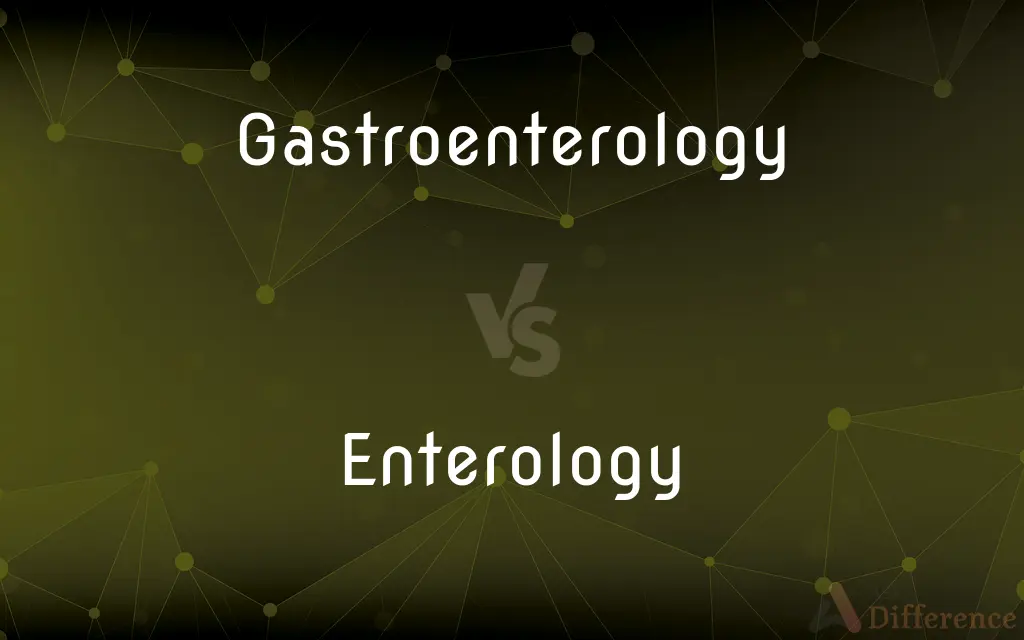Gastroenterology vs. Enterology — What's the Difference?
Edited by Tayyaba Rehman — By Urooj Arif — Updated on April 26, 2024
Gastroenterology focuses on the digestive system and its disorders, encompassing the entire GI tract, whereas enterology specifically studies the small intestine.

Difference Between Gastroenterology and Enterology
Table of Contents
ADVERTISEMENT
Key Differences
Gastroenterology is a branch of medicine dealing with the health of the gastrointestinal (GI) tract, which includes the stomach, intestines, esophagus, liver, pancreas, gallbladder, and bile ducts. On the other hand, enterology is a subfield of gastroenterology that specifically focuses on diseases and conditions of the small intestine.
While gastroenterologists are concerned with a broad range of organs and disorders, enterologists specialize in issues like nutrient absorption, intestinal infections, and specific diseases such as celiac disease or Crohn's affecting the small intestine.
Gastroenterologists may perform procedures like colonoscopies or endoscopies, enterologists often conduct specialized tests and treatments pertaining specifically to the small intestine.
Gastroenterology includes the diagnosis and management of complex diseases such as liver cirrhosis or pancreatic cancer, while enterology tends to concentrate on less extensive yet crucial aspects like small bowel bacterial overgrowth (SIBO).
The knowledge of an enterologist is crucial for detailed understanding and management of intestinal health, particularly in cases where specialized care is required.
ADVERTISEMENT
Comparison Chart
Focus
Entire GI tract including stomach, intestines, esophagus, liver, pancreas, gallbladder
Specifically the small intestine
Common Procedures
Colonoscopies, endoscopies, liver biopsies
Specific tests for small intestine health
Diseases Covered
Broad range including ulcers, GERD, IBS, liver cirrhosis, pancreatic cancer
Focused on diseases like celiac disease, Crohn's
Subspecialization
Includes hepatology, pancreatic diseases, colorectal disorders
Limited to diseases of the small intestine
Primary Concern
Diagnosis and management of digestive health
Diagnosis and management of nutrient absorption issues
Compare with Definitions
Gastroenterology
The branch of medicine that deals with the structure, functions, diseases, and pathology of the stomach and intestines.
Gastroenterology often requires doctors to perform endoscopic procedures.
Enterology
The medical study and treatment of the small intestine.
Enterology is critical in managing diseases like Crohn's.
Gastroenterology
The study of the digestive system and its disorders.
She chose to specialize in gastroenterology because of her interest in digestive health.
Enterology
A field that examines how the small intestine functions and its disorders.
He consults in enterology to address his chronic intestinal infections.
Gastroenterology
A medical practice focusing on the diagnosis and treatment of GI tract diseases.
His gastroenterology appointment helped diagnose his stomach ulcers.
Enterology
A subspecialty of gastroenterology focusing on small intestinal health.
Enterology often deals with complex nutrient absorption issues.
Gastroenterology
The field involving medical and surgical methods to treat digestive diseases.
Advances in gastroenterology have improved treatment for hepatitis tremendously.
Enterology
The study of diseases specific to the small intestine, including diagnostics and treatment.
Her interest in enterology stemmed from a family history of celiac disease.
Gastroenterology
A specialty in medicine dedicated to the digestive system from mouth to anus.
Gastroenterology clinics often offer both diagnostic and therapeutic services.
Enterology
A specialized area concentrating on intestinal diseases such as bacterial overgrowths or malabsorption syndromes.
Enterology has developed specific tests to diagnose small bowel bacterial overgrowth.
Gastroenterology
The branch of medicine that studies the gastrointestinal tract and its diseases
Enterology
The study of the intestines.
Gastroenterology
Gastroenterology is the branch of medicine focused on the digestive system and its disorders. Diseases affecting the gastrointestinal tract, which include the organs from mouth into anus, along the alimentary canal, are the focus of this speciality.
Enterology
The science which treats of the viscera of the body.
Gastroenterology
The branch of medicine which deals with disorders of the stomach and intestines.
Gastroenterology
The branch of medicine that deals with the diagnosis and treatment of diseases and disorders of the digestive system.
Gastroenterology
(medicine) The study of the digestive system, from the mouth to the anus; may also include the study of accessory organs: pancreas, liver, gallbladder and bile ducts.
Common Curiosities
How do gastroenterology and enterology differ in focus?
Gastroenterology covers the entire gastrointestinal system, while enterology focuses specifically on the small intestine.
Why might someone be referred to an enterologist?
If they have specific diseases of the small intestine or complications in nutrient absorption, they might be referred to an enterologist.
Are there diseases only an enterologist would handle?
While gastroenterologists handle many intestinal issues, enterologists specifically manage intricate cases of small intestine diseases like certain types of IBD.
What is gastroenterology?
Gastroenterology is the study of the gastrointestinal tract, including the organs from mouth to anus, along with its disorders.
What does an enterologist do?
An enterologist specializes in the health and diseases of the small intestine, focusing on conditions like Crohn's disease or nutrient absorption issues.
Can a gastroenterologist treat conditions treated by an enterologist?
Yes, gastroenterologists can treat small intestine conditions, but enterologists have specialized knowledge in this area.
How do the diagnostic approaches differ in gastroenterology vs. enterology?
Gastroenterology uses a wide range of diagnostic tools across the GI tract, whereas enterology focuses on specialized techniques for the small intestine.
What procedures are common in gastroenterology but not in enterology?
Procedures like liver biopsies and pancreatic assessments are common in gastroenterology but not typically part of enterology.
What kind of training does an enterologist have?
Enterologists are gastroenterologists with additional training focused on the small intestine.
What advances have been made in enterology recently?
Advances in diagnostic imaging and minimally invasive techniques have improved the detection and treatment of small intestine diseases.
Can enterological diseases affect other parts of the GI tract?
Yes, diseases like Crohn's can affect different parts of the GI tract, though enterology focuses on the small intestine aspects.
Is enterology considered a subspecialty or a separate field?
Enterology is a subspecialty within gastroenterology focused on the small intestine.
How does patient care differ between gastroenterology and enterology?
Gastroenterology offers broad care for all GI issues, while enterology provides concentrated care for specific small intestine conditions.
What symptoms might prompt a visit to an enterologist?
Symptoms like unexplained diarrhea, malnutrition, or chronic abdominal pain might lead one to consult an enterologist.
What role do diet and nutrition play in enterology?
Diet and nutrition are central in enterology, especially concerning how nutrients are absorbed and processed by the small intestine.
Share Your Discovery

Previous Comparison
Spazz vs. Spaz
Next Comparison
Synthesise vs. SynthesizeAuthor Spotlight
Written by
Urooj ArifUrooj is a skilled content writer at Ask Difference, known for her exceptional ability to simplify complex topics into engaging and informative content. With a passion for research and a flair for clear, concise writing, she consistently delivers articles that resonate with our diverse audience.
Edited by
Tayyaba RehmanTayyaba Rehman is a distinguished writer, currently serving as a primary contributor to askdifference.com. As a researcher in semantics and etymology, Tayyaba's passion for the complexity of languages and their distinctions has found a perfect home on the platform. Tayyaba delves into the intricacies of language, distinguishing between commonly confused words and phrases, thereby providing clarity for readers worldwide.














































